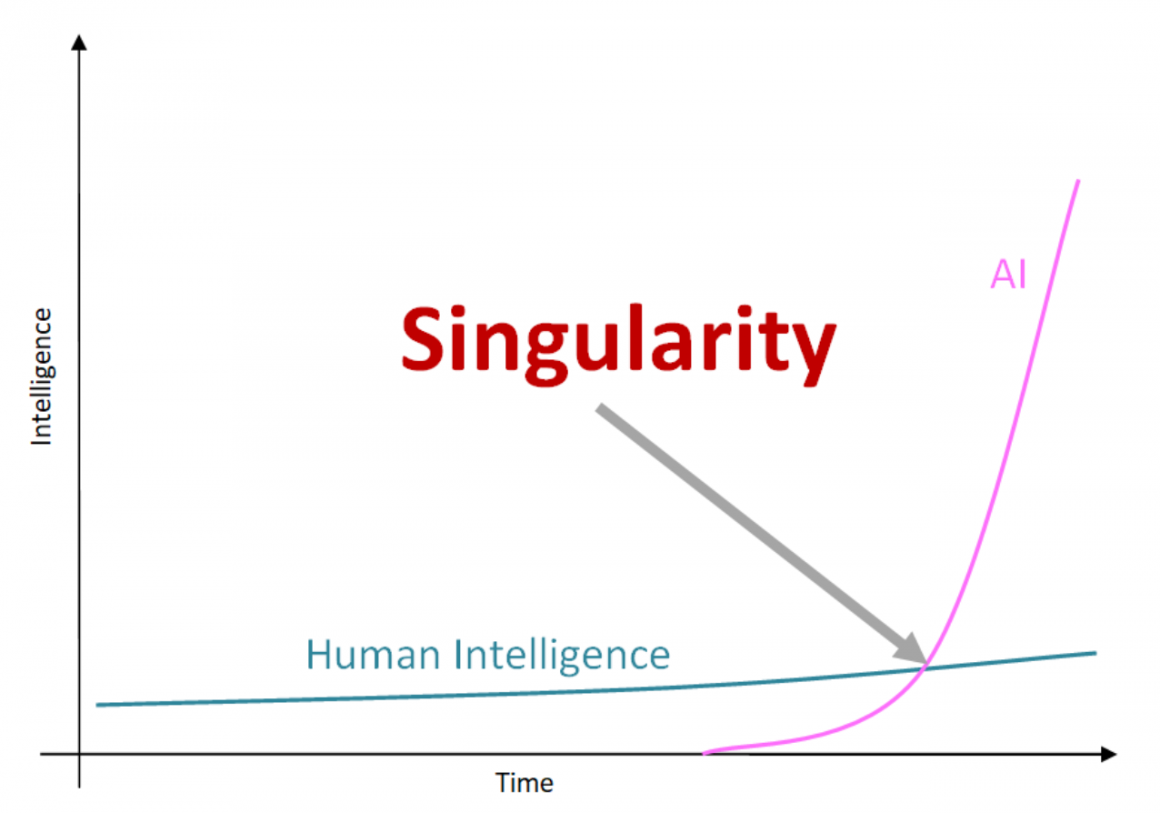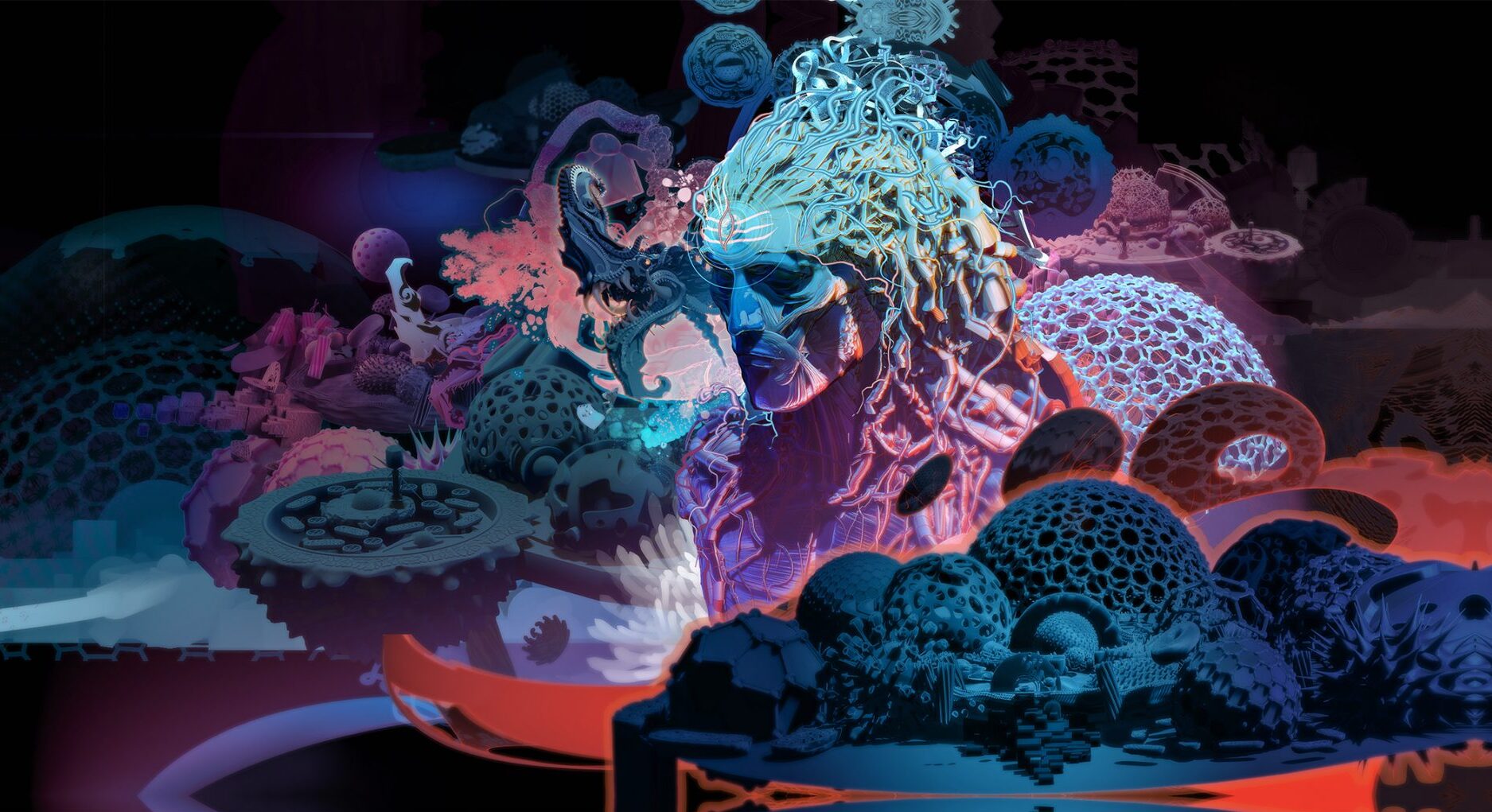I was going to write about the Metaverse next, but the recent acceleration of technological progress convinced me to write about the singularity immediately before it is too late. The technological singularity is the event or the process when machine intelligence surpasses human intelligence, and the speed of progress becomes so fast that no human can keep up. This might be a slow process, some argue we are already in the singularity, or it might be a sudden event, where people live their normal life and from one day to another, the earth gets transformed into a giant CPU by a swarm of self-replicating nanomachines. I cannot predict what it will be like and nobody can predict what will happen after, but I will try to predict the events on the way. My predictions are obviously subjective and will most likely not be precise, they should act as a wake-up call though, to show how fast it might happen. All my predictions neglect the high probability that humanity will destroy itself or will be destroyed by climate change, Sun storms, viruses, war, or something else. Most people without a deeper understanding of Moores’s law look back on the last 10 or 100 years and think we will just continue to develop. Some people who work in fields like machine learning or biology look at their progress at the moment and base their predictions on that. Very few people can to grasp exponential growth, but I tried to always keep it in mind when I make my predictions based on everything I know and believe and every source I can find.

Hardware
Fusion reactor (2023-2026): Fusion is one of the core technologies that we need to fight climate change and solve the energy crises. With fusion reactors like Iter and advancements in artificial intelligence we are on a good way to solving fusion. Breakthroughs like this one are the reason why I am so confident that we will see an energy net plus from a fusion reactor in the next few years. I hope commercial use will be possible shortly after. Fusion technology is a perfect example where people thought it would take way longer because they only looked at the engineering side and ignored progress in areas like math and computing.
Quantum computing(now – 2025): quantum computers are already available and will be an essential part of the supercomputing landscape in the coming years. They will not be used in every household, instead, we will use them for cloud computing and solving big problems like machine learning or traffic control. The double exponential growth in quantum computing will blow their ability up in the next 3 years. I think quantum computers are one of the most overlooked technologies because it is so useless right now. But it is one of the fastest developing technologies at the moment and when they are ready they will unlock a lot of things at the same time.
Room temperature superconductors(2025-never): If and only if a room temperature superconductor exists, we will find it in the next 3 years. Material science will have the support of quantum computing and A.I. to find every possible material. This would be the single most important discovery of all time since it not only solves all energy problems but also allows for cheap transport like the hyperloop and many other applications. Examples like multilayered graphene show that there is still from for discovery but we have to wait and see if this dream is achievable.
AR glasses and contact lenses (2023-2025): In the next few years people will spend most of their time looking at or through a display. Both smart glasses and lenses are right around the corner and will change the way we interact with the internet forever. It is the technology that has the most impact on our everyday lives. the biggest obstacle for AR technology will be the bandwidth of our wireless technology. Since the computation of these devices will happen in the cloud or in our “smartphones” we need to send a lot of high-resolution video streams to a lot of people. current wifi and xG technology will not be enough and we have to wait for wifi 7 and 6G to achieve mass adoption.
VR (now-2025): Virtual reality is already part of modern gaming and will be part of the workspace in the coming years. The Hardware will be there in the next 2 years and will be affordable and good enough for all use cases at the end of 2025. I will talk about VR more when I write about the metaverse.
Brain-Computer-Interface (now-2030) BCIs are already in a test stage for medical applications. With companies like Neuralink, we will most likely see BCI in use for non-medical applications within the next 5 years. I do not believe they will be popular if they are not needed for a medical condition since the risk of putting a chip in your head is too high for most people. The only way I can imagine BCIs becoming mainstream in the next 10 years is through advancements in nanorobotics. With small nanorobots in our bloodstream, we can not only supervise our body but we can also use them as reading devices from inside our brain. The risks won’t be as high and the barrier of entry will be lower. I wrote more about that topic in my post about Human-Machine-Merging.
Robotics (now-2026): I think most physical tasks are already manageable by machines, but most of the time humans are still cheaper. With progress in robotics and third-world countries, machines will replace more and more physical jobs. The global economy and our society will have to change drastically. One of the biggest challenges will be to ensure that everyone profits from a world with an abundance of workforce, so we do not end up with an unemployed underclass.
Space Travel (2025-2030): I am not a fan of space travel. At least not now. It wastes money and time and brain power to get us to the moon or mars just so we can say we were there. The truth is that Mars and Moon are extremely unhabitable and survival is impossible for extended periods thanks to radiation, gravity, temperature, resources, and so on. While humanity will most likely spread out someday, if we survive that long, the idea should be to terraform Mars over a century with technology that will not be available for the next 15 years and let machines do it for us. Sending humans to Mars now is too early and just a waste. Sending machines on the other hand can be quite useful. Space is full of resources, and energy that we can harvest. And we also reached a point where looking out for potential threats to humanity can be useful since we achieved a level where we are able to prevent some of them.
Software
The main reason why I couldn’t wait any longer with this post is the progress in A.I. While breakthroughs in machine learning models used to be a yearly event (GPT 1-3 for example) they started to appear monthly beginning with Aplhafold and nowadays they appear weekly with Models like dall2-2, Gato, Imagen, and other impressive results. Even compared to other exponential metrics like humanity’s energy consumption the growth in machine intelligence is sudden. While the first computer is not even 100 years old we already reached the point where the top supercomputer rival the human brain using the positive feedback loop of hardware and software improvements. If the exponential growth continues like this, machines will surpass the entirety of humanity around 2045. Newer studies suggest that quantum computers improve with double exponential speed, which would mean we reach this point even faster.

Let’s take a look at some of the recent achievements. When Dalle-2 came out in January 2021 people started to dream of an A.I. that could produce Videos out of prompts like Dalle did with pictures and they thought it could happen in the next 5 years. Just one year later we have CogVideo which produces short videos. People think we continue as we did in the last few years, but that is not how exponential growth works. Models like Gato, that can perform 600 different tasks are already impressive, but Gato is more like a proof of concept and is relatively small. Deepmind announced that they are in the process of training a bigger version, while other companies are already working on the next step. Not long until they appear daily and when the hardware can keep up, we will likely see the singularity within the next 5-10 years. It is impossible to say what will happen after that. It depends on factors like; Will the models develop consciousness or not? Will they help humanity or kill us? I think we are already at a point where machines outperform a single human in every single task depending on the metric. In the coming year or two, this will become increasingly obvious to the public when models like GPT-4 or Gato 2 get released. Maybe we find the missing idea for consciousness or maybe it will just appear when they become bigger and more capable but, in the end, it does not matter. They will outperform us and help to speed up the progress in every single area to a point where no human can ever follow. This brings me to the final and most important prediction: When will we achieve AGI (Artificial General Intelligence ) and ASI (Artificial SuperIntelligence)? I predict that we will have some form of AGI around 2025. ASI will greatly depend on the limits humans apply to a potential AGI. If we keep it disconnected from the internet and limit its input and output we can delay an ASI for a few more years, but If we give an AGI access to the internet, its own code, and enough hardware, it could be a matter of minutes.
Conclusion
Our governments were left behind when the internet emerged, and they never caught up. In the last five years, we left behind most of the general population, and in the coming five years not even the experts are going to keep up. We are going to experience the most eventful decade in human history, and there are few things we can do. I find the reactions of people who find out about the singularity quite interesting. Some lose all hope and motivation and become scared of the future and others cheer up and are looking forward to the moment the machine takes over. Many ask how they should prepare and it is hard to answer since nobody knows what will happen. I think it is clear that money will be irrelevant after the singularity, but I would never recommend anyone to waste all their money in the 5 years. It is quite the opposite. Having money could be highly important in the years before the singularity for things like Human-Machine-Merging. Other than that there is not much an individual can do besides hoping for a good outcome.

Leave a Reply